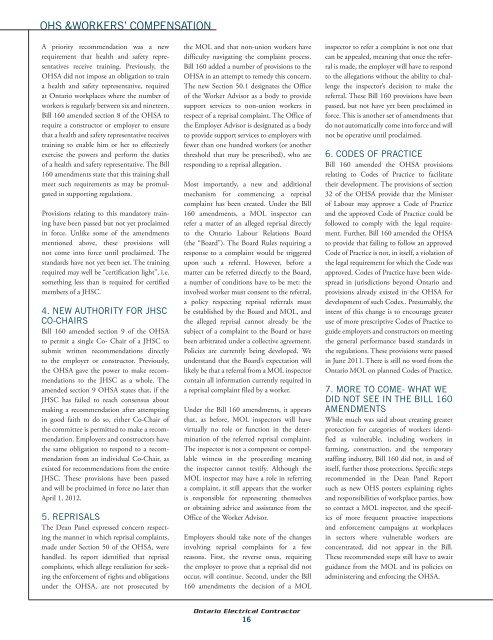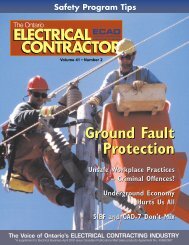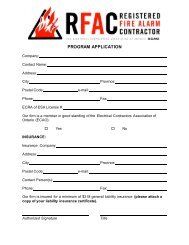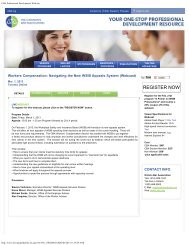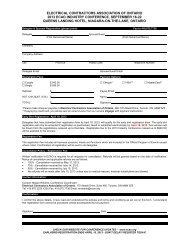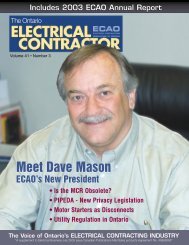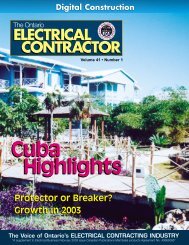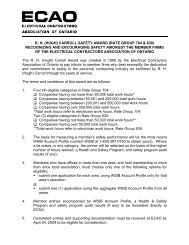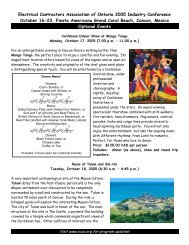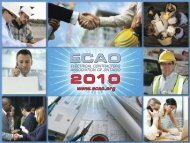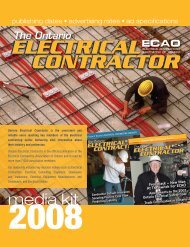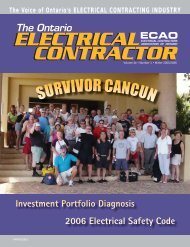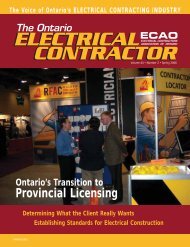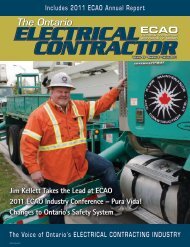Prompt Payment Legislation - Electrical Contractors Association of ...
Prompt Payment Legislation - Electrical Contractors Association of ...
Prompt Payment Legislation - Electrical Contractors Association of ...
- No tags were found...
Create successful ePaper yourself
Turn your PDF publications into a flip-book with our unique Google optimized e-Paper software.
OHS &Workers’ CompensationA priority recommendation was a newrequirement that health and safety representativesreceive training. Previously, theOHSA did not impose an obligation to traina health and safety representative, requiredat Ontario workplaces where the number <strong>of</strong>workers is regularly between six and nineteen.Bill 160 amended section 8 <strong>of</strong> the OHSA torequire a constructor or employer to ensurethat a health and safety representative receivestraining to enable him or her to effectivelyexercise the powers and perform the duties<strong>of</strong> a health and safety representative. The Bill160 amendments state that this training shallmeet such requirements as may be promulgatedin supporting regulations.Provisions relating to this mandatory traininghave been passed but not yet proclaimedin force. Unlike some <strong>of</strong> the amendmentsmentioned above, these provisions willnot come into force until proclaimed. Thestandards have not yet been set. The trainingrequired may well be “certification light”, i.e.something less than is required for certifiedmembers <strong>of</strong> a JHSC.4. NEW AUTHORITY FOR JHSCCO-CHAIRSBill 160 amended section 9 <strong>of</strong> the OHSAto permit a single Co- Chair <strong>of</strong> a JHSC tosubmit written recommendations directlyto the employer or constructor. Previously,the OHSA gave the power to make recommendationsto the JHSC as a whole. Theamended section 9 OHSA states that, if theJHSC has failed to reach consensus aboutmaking a recommendation after attemptingin good faith to do so, either Co-Chair <strong>of</strong>the committee is permitted to make a recommendation.Employers and constructors havethe same obligation to respond to a recommendationfrom an individual Co-Chair, asexisted for recommendations from the entireJHSC. These provisions have been passedand will be proclaimed in force no later thanApril 1, 2012.5. REPRISALSThe Dean Panel expressed concern respectingthe manner in which reprisal complaints,made under Section 50 <strong>of</strong> the OHSA, werehandled. Its report identified that reprisalcomplaints, which allege retaliation for seekingthe enforcement <strong>of</strong> rights and obligationsunder the OHSA, are not prosecuted bythe MOL and that non-union workers havedifficulty navigating the complaint process.Bill 160 added a number <strong>of</strong> provisions to theOHSA in an attempt to remedy this concern.The new Section 50.1 designates the Office<strong>of</strong> the Worker Advisor as a body to providesupport services to non-union workers inrespect <strong>of</strong> a reprisal complaint. The Office <strong>of</strong>the Employer Advisor is designated as a bodyto provide support services to employers withfewer than one hundred workers (or anotherthreshold that may be prescribed), who areresponding to a reprisal allegation.Most importantly, a new and additionalmechanism for commencing a reprisalcomplaint has been created. Under the Bill160 amendments, a MOL inspector canrefer a matter <strong>of</strong> an alleged reprisal directlyto the Ontario Labour Relations Board(the “Board”). The Board Rules requiring aresponse to a complaint would be triggeredupon such a referral. However, before amatter can be referred directly to the Board,a number <strong>of</strong> conditions have to be met: theinvolved worker must consent to the referral,a policy respecting reprisal referrals mustbe established by the Board and MOL, andthe alleged reprisal cannot already be thesubject <strong>of</strong> a complaint to the Board or havebeen arbitrated under a collective agreement.Policies are currently being developed. Weunderstand that the Board’s expectation willlikely be that a referral from a MOL inspectorcontain all information currently required ina reprisal complaint filed by a worker.Under the Bill 160 amendments, it appearsthat, as before, MOL inspectors will havevirtually no role or function in the determination<strong>of</strong> the referred reprisal complaint.The inspector is not a competent or compellablewitness in the proceeding meaningthe inspector cannot testify. Although theMOL inspector may have a role in referringa complaint, it still appears that the workeris responsible for representing themselvesor obtaining advice and assistance from theOffice <strong>of</strong> the Worker Advisor.Employers should take note <strong>of</strong> the changesinvolving reprisal complaints for a fewreasons. First, the reverse onus, requiringthe employer to prove that a reprisal did notoccur, will continue. Second, under the Bill160 amendments the decision <strong>of</strong> a MOLinspector to refer a complaint is not one thatcan be appealed, meaning that once the referralis made, the employer will have to respondto the allegations without the ability to challengethe inspector’s decision to make thereferral. These Bill 160 provisions have beenpassed, but not have yet been proclaimed inforce. This is another set <strong>of</strong> amendments thatdo not automatically come into force and willnot be operative until proclaimed.6. CODES OF PRACTICEBill 160 amended the OHSA provisionsrelating to Codes <strong>of</strong> Practice to facilitatetheir development. The provisions <strong>of</strong> section32 <strong>of</strong> the OHSA provide that the Minister<strong>of</strong> Labour may approve a Code <strong>of</strong> Practiceand the approved Code <strong>of</strong> Practice could befollowed to comply with the legal requirement.Further, Bill 160 amended the OHSAto provide that failing to follow an approvedCode <strong>of</strong> Practice is not, in itself, a violation <strong>of</strong>the legal requirement for which the Code wasapproved. Codes <strong>of</strong> Practice have been widespreadin jurisdictions beyond Ontario andprovisions already existed in the OHSA fordevelopment <strong>of</strong> such Codes.. Presumably, theintent <strong>of</strong> this change is to encourage greateruse <strong>of</strong> more prescriptive Codes <strong>of</strong> Practice toguide employers and constructors on meetingthe general performance based standards inthe regulations. These provisions were passedin June 2011. There is still no word from theOntario MOL on planned Codes <strong>of</strong> Practice.7. MORE TO COME- WHAT WEDID NOT SEE IN THE BILL 160AMENDMENTSWhile much was said about creating greaterprotection for categories <strong>of</strong> workers identifiedas vulnerable, including workers infarming, construction, and the temporarystaffing industry, Bill 160 did not, in and <strong>of</strong>itself, further those protections. Specific stepsrecommended in the Dean Panel Reportsuch as new OHS posters explaining rightsand responsibilities <strong>of</strong> workplace parties, howto contact a MOL inspector, and the specifics<strong>of</strong> more frequent proactive inspectionsand enforcement campaigns at workplacesin sectors where vulnerable workers areconcentrated, did not appear in the Bill.These recommended steps still have to awaitguidance from the MOL and its policies onadministering and enforcing the OHSA.Ontario <strong>Electrical</strong> Contractor16


